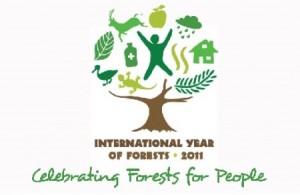International Year of Forests 2011

http://www.un.org/en/events/iyof2011/
http://www.illegal-logging.info
The year 2011 was declared the International Year of Forests by the United Nations to raise awareness and strengthen the sustainable forest management, conservation and sustainable development of all types of forests for the benefit of current and future generations. Forests are an integral part of global sustainable development. According to World Bank estimates, more than 1.6 billion people depend on forests for their livelihoods. The forest product industry is a source of economic growth and employment, with global forest products traded internationally in the order of $270 billion. The UN’s Food and Agriculture Organization (FAO) estimates that every year 130,000 km² of the world’s forests are lost due to deforestation. Conversion to agricultural land, unsustainable harvesting of timber, unsound land management practices, and creation of human settlements are the most common reasons for this loss of forested areas. Read More: >HERE<
Indigenous rights are those rights that exist in recognition of the specific condition of the indigenous peoples. This includes not only the most basic human rights of physical survival and integrity, but also the preservation of their land, language, religion and other elements of cultural heritage that are a part of their existence as a people. This can be used as an expression for advocacy of social organizations or form a part of the national law in establishing the relation between a government and the right of self-determination among the indigenous people living within its borders, or in international law as a protection against violation by actions of governments or groups of private interests. Read More: > HERE <
Welcome to the International Year of Forests, 2011 (Forests 2011) Web site, a global platform to celebrate people’s action to sustainably manage the world’s forests. The United Nations General Assembly declared 2011 as the International Year of Forests to raise awareness on sustainable management, conservation and sustainable development of all types of forests.
Here, you will find information regarding events being organised throughout the International Year as well as interactive web tools and resources to promote dialogue on forests. Tell us how you plan to celebrate “forests for people” during 2011, so that we may showcase your stories and initiatives through this website. www.un.org/en/events/iyof2011
United Nations, New York, 2 November 2010 – Member States of the United Nations have adopted a new 10-year global strategy designed to halt the loss of the world biological diversity, with countries agreeing to draft national implementation plans to safeguard genetic resources within two years. / This video shows how palm oil is threatening Southeast Asia’s tropical peatlands. Due to drainage of the swamps, the peat oxidates and releases huge amounts of CO2 into the atmosphere. For more information, see www.ckpp.org
United Nations Forum on Forests (UNFF) –In October 2000, the Economic and Social Council of the United Nations (ECOSOC), in its Resolution 2000/35 established the United Nations Forum on Forests (UNFF), a subsidiary body with the main objective to promote “… the management, conservation and sustainable development of all types of forests and to strengthen long-term political commitment to this end…”based on the Rio Declaration, the Forest Principles, Chapter 11 of Agenda 21 and the outcome of the IPF/IFF Processes and other key milestones of international forest policy. The Forum has universal membership, and is composed of all Member States of the United Nations and specialized agencies. www.un.org/esa/forests/index.html
The International Indigenous Forum on Biodiversity (IIFB) was formed During the III Conference of the Parties to the Convention on Biological Diversity (COP III) in Buenos Aires, Argentina, in November 1996. The IIFB is a collection of representatives from indigenous governments, indigenous non-governmental organizations and indigenous scholars and activists that rganize around the Convention on Biological Diversity (CBD) and other important international environmental meetings to help coordinate indigenous strategies at these meetings, provide advice to the government parties, and influence the interpretations of government obligations to recognize and respect indigenous rights to the knowledge and resources.
http://iifb.indigenousportal.com/2010/11/01/closing-statement cbd
The CBD is an important international environmental convention, because it contains numerous passages that recognize traditional resource and knowledge rights, the most important of which is Article 8(j).
www.un.org/millenniumgoals www.endpoverty2015.org
1. Eradicate extreme poverty and hunger
2. Achieve universal primary education
3. Promote gender equality and empower women
4. Reduce child mortality
5. Improve maternal health
6. Combat HIV/AIDS, malaria and other diseases
7. Ensure environmental sustainability
8. Develop a global partnership for development
In September 2000, building upon a decade of major United Nations conferences and summits, world leaders came together at United Nations Headquarters in New York to adopt the United Nations Millennium Declaration, committing their nations to a new global partnership to reduce extreme poverty and setting out a series of time-bound targets – with a deadline of 2015 – that have become known as the Millennium Development Goals.
Comments are closed.